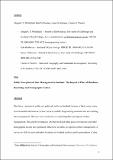Files in this item
Public perceptions of deer management in Scotland : the impact of place of residence, knowledge and demographic factors
Item metadata
| dc.contributor.author | Whitefield, Abi | |
| dc.contributor.author | McMorran, Rob | |
| dc.contributor.author | Paterson, James | |
| dc.contributor.author | Warren, Charles Raymond | |
| dc.date.accessioned | 2022-04-28T23:42:44Z | |
| dc.date.available | 2022-04-28T23:42:44Z | |
| dc.date.issued | 2021-04-29 | |
| dc.identifier | 273872918 | |
| dc.identifier | 20536a94-6d34-4715-823d-b94ef3bffb3b | |
| dc.identifier | 85105418590 | |
| dc.identifier | 000648284100001 | |
| dc.identifier.citation | Whitefield , A , McMorran , R , Paterson , J & Warren , C R 2021 , ' Public perceptions of deer management in Scotland : the impact of place of residence, knowledge and demographic factors ' , Scottish Geographical Journal , vol. 137 . https://doi.org/10.1080/14702541.2021.1920048 | en |
| dc.identifier.issn | 1470-2541 | |
| dc.identifier.other | ORCID: /0000-0001-7291-4221/work/93161687 | |
| dc.identifier.other | ORCID: /0000-0003-4449-4068/work/94291621 | |
| dc.identifier.uri | https://hdl.handle.net/10023/25260 | |
| dc.description.abstract | Deer have a prominent public and political profile in Scotland because of their iconic status, environmental and socio-economic impacts, and the long-running controversies surrounding their management. However, few studies have examined public perceptions of deer management. This article investigates whether rural and urban place of residence and other demographic factors are significant influences on public perceptions of deer management. A survey (n = 184) in rural and urban locations in Scotland explored public perceptions of deer management in contrasting localities. Place of residence, demographic information and self-reported knowledge levels were analysed to examine their impact on perceptions. Respondents generally agreed that deer management is necessary, with fencing and culling the first and second most preferred management options. Rural or urban place of residence had a limited influence on opinions of deer management, with engagement in land-based employment playing a more important role. Self-reported understanding of deer management was the most important factor in shaping opinions; those with greater knowledge were more likely to support deer culling. The findings suggest that improved public education concerning the need for deer management would be beneficial, increasing public understanding of management practices. | |
| dc.format.extent | 17 | |
| dc.format.extent | 953056 | |
| dc.language.iso | eng | |
| dc.relation.ispartof | Scottish Geographical Journal | en |
| dc.subject | Scotland | en |
| dc.subject | Public perceptions | en |
| dc.subject | Deer management | en |
| dc.subject | Environmental studies | en |
| dc.subject | G Geography (General) | en |
| dc.subject | T-NDAS | en |
| dc.subject.lcc | G1 | en |
| dc.title | Public perceptions of deer management in Scotland : the impact of place of residence, knowledge and demographic factors | en |
| dc.type | Journal article | en |
| dc.contributor.institution | University of St Andrews. School of Geography & Sustainable Development | en |
| dc.contributor.institution | University of St Andrews. St Andrews Sustainability Institute | en |
| dc.contributor.institution | University of St Andrews. Geographies of Sustainability, Society, Inequalities and Possibilities | en |
| dc.contributor.institution | University of St Andrews. Environmental Change Research Group | en |
| dc.identifier.doi | 10.1080/14702541.2021.1920048 | |
| dc.description.status | Peer reviewed | en |
| dc.date.embargoedUntil | 2022-04-29 |
This item appears in the following Collection(s)
Items in the St Andrews Research Repository are protected by copyright, with all rights reserved, unless otherwise indicated.

